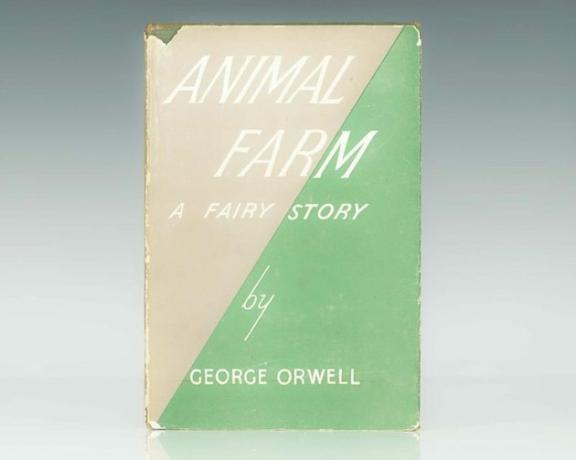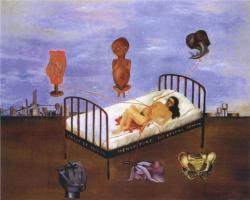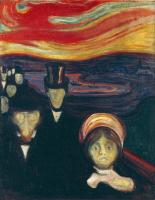Novel Rebellion on the Farm by George Orwell: summary and analysis of the novel
Rebelion on the farm is a dystopian fable by the English writer George Orwell.
Orwell criticizes Stalin through the personification of animals; therefore it is an allegorical book written and published during World War II with a strong questioning character.
It is considered a masterpiece of the author and has been adapted to the cinema twice. Magazine Time he chose Rebelion on the farm as one of the best hundred works published between 1923 and 2005.
Summary of Rebelion on the farm
The story narrated by Orwell takes place at the Manor Farm, an estate in England that belongs to Mr. Jones. Chickens, pigeons, pigs, dogs, horses, goats, donkeys, sheep and cows are the main characters in the story.
In the fiction created by the English writer, animals have human characteristics: they make dense questions about politics, philosophy and identity. They organize and try to create a utopian society after harsh criticism of the man, in this case represented by the figure of Mr. Jones.
Man is the only being that consumes without producing. He does not give milk, he does not lay eggs, he is too weak to pull the plow and his speed does not even allow him to catch rabbits. However, he is the owner and lord of all animals. He makes them work, gives them the minimum necessary to maintain them and the rest he keeps to himself. Our work works the land, our manure fertilizes it, and yet there is not one of us who possesses something other than its skin. You cows, who are here, how many thousands of liters of milk have you given this last year? And what has been done with that milk that was to be used to raise robust calves? Every last drop has gone to the palate of our enemies. And you chickens, how many eggs have you laid this year and how many chicks have hatched from those eggs? Everything else has gone to the market to make money for Jones and his people.
The speech is by Old Major, a pig of a certain age with a deep sense of justice. The most important ideal in Major's life was to make the farm animals rich and free. According to him, all men are enemies and all animals are comrades and equals.
Major takes the first step in the movement on the farm that sought to unite the animals and start the rebellion. However, he died three days after the first step towards his much desired egalitarian society.
Who assumed the command post after the death of Major were the pigs Snowball, Squealer and Napoleon. The trio organized Major's ideals into a system of thought called Animalism.
Animalism is a fictional political theory that creates Orwell's book and resembles what was in history the Stalinism. Major started a revolution that he could never see made. The basic principle of Animalism is summed up in a single sentence:
(...) four legs, well; two legs, bad (...)
The flag of the farm was replaced by that of the new regime. The new one was made of green cloth (referring to the countryside) and bore two stamps: a horn and a helmet (referring to the animal world).
The animals created a hymn titled "Animals of England" that underlined the hope and desire for equality and freedom for all.
They instituted in the new society seven commandments that would guide Animalism and community life:
- Anything that walks on two legs is an enemy.
- Anything that walks on all fours or has wings is a friend.
- No animal will wear clothes.
- No animal will sleep in a bed.
- No animal will drink alcohol.
- No animal will kill another animal.
- All animals are equal.
The animals came to be called comrades among themselves, and all matters of collective interest were brought to a vote in the assembly. In one of the first meetings it was discussed, for example, whether or not rats were animal friends. Together, they also voted on the retirement age for each class of animal, and decided to institute a literacy class for all.
It was during the sneak encounters that a great rebellion was planned. One day Mr. Jones drank too much and forgot to feed the animals. It was the excuse for the beginning of a new era. The animals, faced with hunger and injustice, united and made a great revolution expelling humans from the ranch.
The changes were rapid and substantial: the house where Mr. Jones and his wife lived was turned into a museum, the name of the property changed from Manor Farm to Animal Farm.
Life on rural property passed well after the revolution, but it should be emphasized that, although They all worked, Mollie and the cat dodging their chores by showing up only at foods.
The pigs also did not work properly, they hardly directed and supervised the work of others. They asserted that, as they were the owners of knowledge and forerunners of the revolution, it was natural for them to assume leadership.
Snowball, Squealer, and Napoleon gradually assumed privileges in the community. The milk disappeared and was found in the food of the pigs, the apples were hidden and taken to the deposit of the tools to be also consumed by the pigs. Small privileges were won by those who were considered the intellectual workers.
One beautiful day, Mr. Jones returned to retake the ranch. Armed and with more than half a dozen colleagues, he returned to the farm with shotgun in hand, but the animals managed to expel the former owner of the property.
Snowball, trying to optimize the production and supply of electrical energy on the farm, proposed the construction of a mill. The project progressed, but it generated misunderstandings at the top of the group. Finally, during a meeting in the barn, Snowball was driven off by Napoleon.
The pigs moved into the house where Jones lived, although initially it was to function as a museum. Napoleon, ambitious, decided to do business with neighboring farms, forcing the animals to greatly increase production.
Power began to rise to his head, and the situation worsened considerably. The other animals had less and less food and more work. The leader went so far as to forbid the animals to sing the song they liked so much "Animals of England" arguing that it only worked at the time of the revolution.
Napoleon declared that it was beneficial to negotiate farm products with men, including Frederick, who made a "farm coup". The disagreement turned into a real conflict in which the property was invaded and many animals were killed in battle.
Over time the farm grew, as the animals had young. They transformed the regime into a republic, and Napoleon, the only candidate for office, was elected.
Thanks to his business relationships with humans, he strengthened his ties with those he hated so much, and established methods that facilitated production, controlled expenses, ration and schedules of job.
The pig gained human characteristics, becoming as corrupt as the former owner of the farm. At the end of the story there is a symbiosis between the pig and the being whom he used to loathe so much: man.
Now, there was no doubt about what happened to the physiognomy of pigs: the other creatures saw in the pig a man, in the man a pig and in the pig a man again; but now it was impossible to distinguish who was a man or who was a pig.
Analysis of Rebelion on the farm
According to the author, Rebelion on the farm refers to the events that occurred after the Communist Revolution (1917) and the Stalinist era in the Soviet Union. Through animals, we learn more about life in an egalitarian community.
Orwell wanted to denounce the terrible dictatorship established after Stalin came to power. In the narrated story we see how, through the pig Napoleon, power rises to his head, and a leadership position causes a supposed representative of the people to abuse for profit personal.
Napoleon is gradually corrupted: the pig begins by stealing the milk, having exclusive access to the blocks, and ends up moving to the Jones house, which was to be preserved as a museum according to the vote collective.
Through his literature, the English writer criticizes, for example, the cult of personality and censorship. Napoleon, at a particular moment in history (when he notices his influence on the community), forbids the animals the music that made them happy. After being censored, neither the animals nor the reader know what the real reason for the ban is.
The book appears to be a strong message against totalitarianism and oppression. The narrative reminds us of how we can all be corrupted and how authoritarianism harms life in society.
Information manipulation and blackmail, two of Orwell's biggest concerns, also appear. In order to keep the animals united around equality, the pigs constantly remind their comrades of the terrible reality of the farm in the time of Mr. Jones.
With an easy and accessible language, full of humor, the book seeks the attention of all types of readers; it was a bestseller at the time of its publication and in subsequent editions. Curiously, Rebelion on the farm It continues to be an extremely current work since it deals with issues that do not lose validity, such as the game of power, censorship and manipulation of the masses.
When creating Rebelion on the farm, the English writer mixes the genres: on the one hand you can find features of the fables with a moral, whose most significant representative is Aesop, and on the other, a political satire.
You may also like: 25 short novels to read.
Characters
Animals are the protagonists of the play, in particular the pig Napoleon, the leader who resembles a dictator at the top of the farm's command.
Mr jones
He is the owner of the farm. He exploited animals for the highest possible profit, and did not provide good living conditions. Some say that the character was inspired by Nicholas II, the last Russian emperor, an alcoholic who detested the people, just like Mr. Jones.
Old Major
He is a bearded pig, already of a certain maturity, respected among animals thanks to his twelve-year experience. He was full of ideas, and he was the first to try to bring the group together in an autonomous and egalitarian society. Legend has it that the character was inspired by Marx, an idealist capable of mobilizing the masses who died without seeing the fruits of the revolution that he tried to establish.
Snowball, Squealer and Napoleon
They are pigs raised by Mr. Jones for sale. With Major's death, they assume leadership of the community.
The fights portrayed between Snowball, who has an expansionist profile, and Napoleon, who is clearly a dictator, refer to the fights between Trotsky and Stalin, two left-wing idealists in disagreement over the way in which they should implement the regime.
The Napoleon pig could represent a series of dictators such as Stalin (Soviet Union), Augusto Pinochet (Chile), Mao Tse Tung (China) or Salazar (Portugal). The figure of Napoleon is most often associated with Stalin, because he implemented the principles of the revolution and had a violent personality.
Pig Squealer represents government propaganda, always spoken eloquently to maintain order.
Bluebell, Jessie and Pincher
Three puppies from the property.
Boxer and Clover
Traction horsepower. Boxer is a tireless worker, an example to be followed by the inhabitants of the farm. True to the world of work and social commitment, he was considered the model farm worker.
Mollie
A white mare whose weaknesses were vanity and gluttony. Mollie liked to walk with her ribbons and eat sugar cubes. It represents selfishness and individualism by placing its needs before those of other animals.
Muriel
A white goat.
Benjamin
The donkey, the oldest animal on the farm and the most moderate.
Moses
Domesticated raven and pimp who lived with the Jones family.
Analysis of the main phrases
All animals are the same, but some animals are more equal than others.
It is the conclusion of the end of the book, and represents the desire for communion and freedom corrupted by ambition and the power achieved by pigs.
In the beginning the rules were clear, for example, no animal will sleep in bed, and they end up transforming by allowing dubious amendments. The bed-sleeping ban quickly changes to "no animal will sleep in bed with sheets." It is not by chance that pigs took advantage of these amendments.
The universal rules became particularized depending on who it was, corrupting the system that was committed to equality for all.
If man is eliminated, the main cause of hunger and overwork will disappear forever.
The phrase is said at the beginning of the book, when Major was trying to convince the animals of the need to break free from Mr. Jones's domain.
During the speech he tries to persuade his companions by explaining how they are exploited by Mr. Jones who takes advantage of the animals' circumstances. Major identifies man as the cause of all evils, and seeks to establish a different society based on new values.
Historic context
Being written in the middle of World War II (between November 1943 and February 1944) and published on August 17, 1945, in England, the book has clear political references.
Across the pages there is an obvious criticism of the Stalinist dictatorship at a time when the Soviets were allied to the West.
It is worth remembering that Stalin was loved by the British people and government, a matter that left the writer George Orwell deeply uncomfortable. Not by chance the book was rejected by various publishers: many retaliated against the publication.
Fun fact: Orwell fought in the Spanish Civil War and there he met Stalin's Soviet army closely. The author also worked at the BBC until he asked to leave to write a book denouncing the real character of the Stalinist regime. The play is an acid satire; it has often been interpreted as a strong criticism against communism.
Publication of the book
The work composed by George Orwell was rejected by various publishers until it was published by a small publishing house in 1945.

Film adaptations
1954 film
The first adaptation of one of George Orwell's masterpieces was made in 1954 in an animated design format by a British-American co-production. The directors, pioneers of the feature film, were John Halas and Joy Batchelor.
The film was important to the history of cinema in England. Rebelion on the farm it was the second animated feature film production produced in the country. (The first, Handling Ships, is from 1945). The film was nominated for a Bafta in the category of Best Animation in 1956.
1999 film
The second film adaptation was directed by John Stephenson and released in October 1999. The second montage was very different from the first, especially because it had real animals instead of animated ones.
George Orwell biography
Eric Arthur Blair, born in Montihari (a small Bengali town) chose the pseudonym George Orwell to work as a journalist, essayist and novelist.
Born on June 25, 1903, Orwell was the son of an English colonial official, an agent of the British Opiate Department.
Before becoming a writer, Orwell worked with the Imperial Indian Police. He didn't last long in office because he quickly realized that he wanted to dedicate himself exclusively to writing.
In his thirties he moved to the capital of France, where he led a bohemian life full of pleasures. In 1936 Orwell's happiness ended when he embarked on Spain to fight against Franco.
In 1933 Orwell published his first book, entitled Down and Out in Paris and London. In 1945 he published the work that would be one of his masterpieces, Rebelion on the farm.

In his personal life the writer married Eileen, with whom he adopted a boy named Richard Horatio Blair. Richard was the only descendant of him.
Orwell widowed very young, barely 41 years old. Depressed by the loss, he moved to a house away from the city, located on the Scottish island of Jura.
Five years later, subdued by tuberculosis, the writer died, leaving the production of his literary work as a legacy.
(Translated and adapted by Claudia Gomez Molina).



